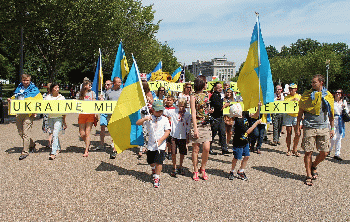
37a.Start.UkraineUnityMarch.Wh iteHouse.WDC.16August2014
(Image by Elvert Barnes from flickr) Details DMCA
The unfolding tragedy of the war in Ukraine has unleashed a torrent of anger among Americans. That's hardly surprising, given the images of dead and injured civilians, especially children, that are streaming into our homes 24 hours a day. The intense emotions aroused have led to a strong urge to act to stop the violence. Demonstrations of solidarity are inspiring, but they aren't going to affect Putin's plans for Ukraine. The question thus is, how do we most effectively stand with Ukraine?
Examples of what not to do abound. Consider:
Most people support the sanctions, despite abundant evidence showing that they typically don't work and at best achieve only limited success. The logic is to punish the citizens of the sanctioned country, in the hope they will rise up and topple their governments or at least submit to Western demands. It should come as no surprise that this is not a realistic objective in authoritarian societies. The main effect of sanctions is to increase the suffering of the citizens of the targeted country. Madelaine Albright famously admitted that US sanctions on Iraq after the first Gulf War cost the lives of 500,000 children, commenting that "We think it was worth it." This begs the question of who is this "we?" I certainly hope that it is not the opinion of the majority of Americans. In the present case, why would we want to punish the citizens of Russia for Putin's actions, especially when they are protesting by the tens of thousands on the streets of Russia, putting to shame the pitiful response of Americans to US-led wars.
Most people seem to support the arming of Ukraine, even though many analysts point out that there is ultimately little hope that they can hold up against a determined Russian military whose goal does not appear to be occupation. We're told daily about Putin's willingness to use brutal tactics to achieve his objectives, but we are being assured that the vastly inferior forces of Ukraine are really winning. As a result, people who want to support Ukraine are applauding the brave citizens who are taking up arms and putting their bodies on the line confronting trained soldiers, without apparently realizing that this will not likely change the outcome but will certainly lead to more Ukrainian deaths. There has even been serious consideration of the US providing incentives to NATO countries to send war planes to Ukraine, an act of war against Russia that could lead to the US being forced to directly confront the only other nuclear superpower. More and more, we are hearing arguments for why we can't rule out direct US involvement despite the fact that it could quickly lead to nuclear war.
There's a reason that "experts" continue to push policies that are at best futile and at worst, catastrophic. The only realistic alternatives would involve allowing Russia to achieve some of its stated goals. That would lead to the career-killing charge of "appeasement." Career politicians and professional pundits in the West cower at this thought, so much so that the idea would never occur to them. Fortunately, diplomats in both Ukraine and Russia are willing to consider what would be unthinkable for these cheerleaders of imperialism.
According to this article, progress is being made on a 15-point plan that would recognize legitimate Russian security interests the West ignored in the runup to the war, despite clear warnings from Russia. Among other provisions, Ukraine would alter its constitution to guarantee that it would never join NATO. Had the US simply declared that it would never allow Ukraine to join, the invasion might have been avoided. That the US refused speaks volumes about the intent of the US in its dealings with Russia with regard to Ukraine. Unfortunately, few are listening.
Russia is also insisting on an agreement that Ukraine will not host foreign military bases. Negotiations continue on what kind of security guarantees that Ukraine might get from NATO countries would be acceptable to Russia, while the article does not mention what kind of security guarantees Ukraine would offer the Republics of Donetsk and Luhansk, which have been subjected to continuous assault since the 2014 coup that put the current government in power. The article also does not mention the status of the Russian demand that Ukraine recognize Russia's sovereignty over Crimea, which it has asserted since the region voted overwhelmingly to rejoin Russia in 2014.
Meanwhile, the battles rage, with increasing loss of life on both sides. If you want to stand for Ukraine, stand for the interests of Ukrainians and common Russians alike and demand that your government stop inflaming the situation with weapons and sanctions and allow real diplomacy to end the killing.





